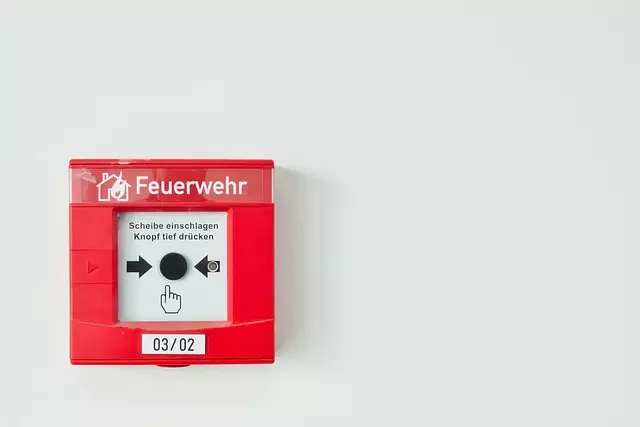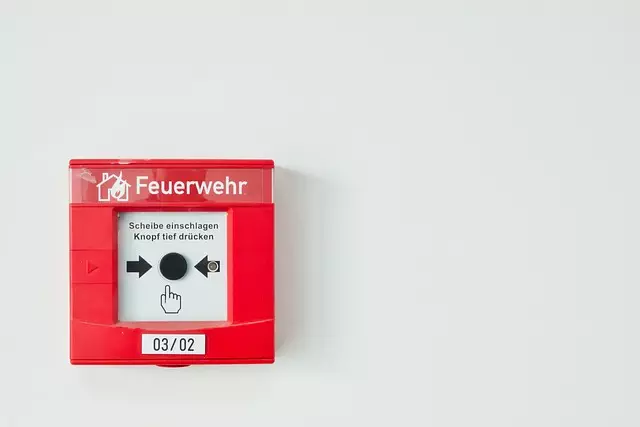Fire alarm system installation in Fayetteville, North Carolina, is a critical safety measure that demands adherence to strict local and national codes and standards, including the International Fire Code (IFC), National Fire Alarm and Signaling Code (NFPA 72), and North Carolina State Building Code. A reliable fire alarm system detects smoke, heat, or flames and sends alerts via either wired or wireless networks, chosen based on the building's characteristics and expansion potential. The choice between these systems is influenced by factors such as building size and the need for future scalability. A well-installed system must accurately send signals to a central control panel and then to occupants through audible and visual alarms, with the capability to alert emergency services if necessary. Ongoing maintenance and testing are crucial for optimal functionality, especially in critical moments. In Fayetteville, professional installers ensure compliance, tailored protection, and peace of mind by adhering to both technical and regulatory requirements, offering fire alarm system installation services that protect lives and property against the dangers of fire. For those seeking top-notch fire alarm system installation fayetteville north carolina, it is essential to select a provider well-versed in the latest NFPA codes and standards, equipped with cutting-edge technology for effective communication and alerting systems.
Fire alarm systems are critical components of building safety, serving as the first line of defense against fire hazards. In Fayetteville, North Carolina, where historical buildings stand alongside modern developments, the robustness of a fire alarm system’s signal transmission is paramount. This article delves into the essential aspects of fire alarm system installation in Fayetteville, North Carolina, emphasizing the components that ensure reliable signal transmission and adherence to legal requirements. From understanding the fundamentals of signal transmission to selecting a professional provider for optimal performance, readers will gain valuable insights into maintaining safety through advanced fire detection systems. Key considerations include the importance of professional installation, the latest in fire alarm technology, and the best practices for compliance with North Carolina’s regulations.
- Understanding Fire Alarm System Signal Transmission Fundamentals
- The Importance of Professional Installation for Fire Alarm Systems in Fayetteville, North Carolina
- Components of a Modern Fire Alarm System and Their Role in Signal Transmission
- Navigating the Legal Requirements and Best Practices for Fire Alarm System Installation in NC
- Selecting a Reliable Fire Alarm System Provider in Fayetteville for Efficient Signal Transmission
Understanding Fire Alarm System Signal Transmission Fundamentals

In the realm of building safety and fire prevention, a robust fire alarm system is a critical component. Its effectiveness hinges on the reliable transmission of signals that alert occupants and authorities to an impending danger. The installation of a fire alarm system in Fayetteville, North Carolina, or any location, involves a meticulous process where the signal transmission architecture is paramount. These systems are designed to detect smoke, heat, or flames and then communicate this critical information via a network of interconnected devices. The signaling pathways can include wired connections, such as conventional addressable loop schemes, or wireless networks that ensure uninterrupted communication even in the event of a power outage. The choice between these methods often depends on the specific needs of the structure, its size, and the potential for future expansions. A well-designed fire alarm system installation in Fayetteville, North Carolina, must be capable of swiftly sending signals to the central control panel and then to occupants through audible alarms, visual indicators, and, if necessary, direct communication with emergency services. The transmission medium, whether it be traditional wired cabling or advanced wireless technology, must be dependable, allowing for no delay in the event of an actual fire. Regular maintenance and testing are essential to ensure that these systems function optimally when they are most needed, safeguarding lives and property against the ravages of fire.
The process of installing a fire alarm system is not merely about placing detectors and alarms; it’s about establishing a sophisticated network that can discern between true alarms and false ones to minimize nuisance alarms and ensure the integrity of the system. In Fayetteville, North Carolina, and across the nation, adherence to local and national codes and standards is crucial for the efficacy of fire alarm systems. These codes dictate the placement of devices, the type of signal transmission used, and the protocols for system monitoring and maintenance. The installation process requires a skilled team with expertise in both the technical aspects of the system and the regulatory requirements that govern it. By integrating cutting-edge technology with industry best practices, fire alarm systems can be tailored to meet the unique needs of any building, providing peace of mind and enhancing safety for all occupants.
The Importance of Professional Installation for Fire Alarm Systems in Fayetteville, North Carolina

In Fayetteville, North Carolina, the safety of residents and commercial entities is paramount, particularly in the face of potential fire threats. A robust fire alarm system installation in Fayetteville, North Carolina, is not just a matter of compliance but a critical investment in protection and peace of mind. Professional installation services for fire alarm systems ensure that each component, from the smoke detectors to the central control panels, is meticulously placed according to local building codes and fire safety regulations. These experts are trained to navigate the complexities of fire alarm system design, which includes selecting the right technology, optimizing sensor placement, and configuring the system for minimal false alarms while maintaining high sensitivity to real threats. This technical proficiency is vital in a region like Fayetteville, where the blend of residential, commercial, and industrial properties demands tailored solutions that only professional installers can provide. Moreover, the after-installation support, including regular maintenance checks and system updates, underscores the importance of enlisting professionals for fire alarm system installation in Fayetteville, North Carolina. This ongoing service is crucial for ensuring the system’s reliability and efficiency over time, thereby safeguarding lives and property against the destructive power of fire.
Components of a Modern Fire Alarm System and Their Role in Signal Transmission

A modern fire alarm system is a critical component of any building’s safety infrastructure, and its effective signal transmission is paramount to ensuring timely evacuation and firefighting responses. At the heart of this system are several key components that work in concert to detect fires and relay information promptly. These include smoke detectors, heat sensors, manual pull stations, and control panels, all interconnected through a network designed for signal transmission. The detection devices monitor the environment for signs of fire, such as smoke or an increase in temperature, activating upon sensing these hazards. The control panel serves as the system’s command center, analyzing data from each sensor and determining whether a genuine threat exists. Upon confirmation of a fire incident, the system initiates an alarm, signaling occupants to evacuate and alerting emergency services.
Signal transmission in a fire alarm system is facilitated through both wired and wireless connections. Wired systems are typically more reliable, with low-voltage cables linking sensors to the control panel. These cables ensure that the signals are direct and protected from external interference. Wireless systems, on the other hand, use radio frequencies or infrared signals to communicate between components. They offer greater flexibility in installation, especially in buildings where running wires is impractical or in historic structures like those undergoing fire alarm system installation in Fayetteville, North Carolina, where maintaining the integrity of the architecture must be considered. Regardless of the transmission method, once an alert is triggered, it is essential that the signal reaches the control panel and then to all necessary parties—be it occupants via audible alarms or off-site monitoring centers and fire departments via digital communication networks. The reliability and speed of this signal transmission can significantly reduce the damage caused by a fire and save lives.
Navigating the Legal Requirements and Best Practices for Fire Alarm System Installation in NC

When installing a fire alarm system in Fayetteville, North Carolina, adherence to both local and state legal requirements is paramount. The Town of Fayetteville, as per the International Fire Code (IFC) and the National Fire Alarm and Signaling Code (NFPA 72), mandates that all fire alarm systems must be designed, installed, and maintained to ensure the highest level of safety for occupants and compliance with legal standards. The North Carolina State Building Code also provides specific guidelines for fire alarm system installation, which include obtaining the necessary permits before commencement of work. Additionally, the systems must be monitored by a licensed central station that complies with the regulations set forth by the state.
Best practices for fire alarm system installation in Fayetteville, NC, extend beyond mere adherence to legal requirements. It is advisable to engage with experienced professionals who are well-versed with the nuances of the local codes and can navigate complexities such as system zoning, smoke and heat detector placement, and integration with sprinkler systems. These experts will ensure that the fire alarm system installation not only meets but exceeds the minimum standards, providing a robust and reliable safety system. Furthermore, regular inspections, maintenance, and testing are crucial to maintaining the functionality of the system over time, ensuring that it operates correctly when needed most. This proactive approach contributes to the overall safety and preparedness of commercial, industrial, and residential buildings within the region.
Selecting a Reliable Fire Alarm System Provider in Fayetteville for Efficient Signal Transmission

When selecting a reliable fire alarm system provider in Fayetteville, North Carolina, for efficient signal transmission, it’s crucial to consider several factors that ensure your investment is safeguarded against potential threats. A reputable provider will offer comprehensive services that include the installation of fire alarm systems adhering to the latest National Fire Protection Association (NFPA) codes and standards. This commitment to compliance not only guarantees the effectiveness of the system but also ensures that it meets the stringent requirements necessary for timely and accurate signal transmission during an emergency.
Moreover, a reliable provider will leverage advanced technology and state-of-the-art equipment for fire alarm system installation in Fayetteville, North Carolina. They should provide options for both wired and wireless systems, allowing for the integration of the latest communication protocols that can send alerts to your smartphone or central monitoring services with greater speed and reliability. By prioritizing signal clarity, range, and redundancy, a top-tier provider will ensure that your business or residential property is well-protected against the dangers of fire, with a system designed to alert occupants and emergency responders promptly in the event of an incident.


